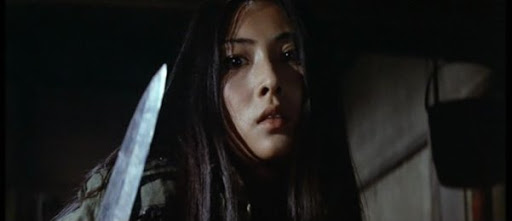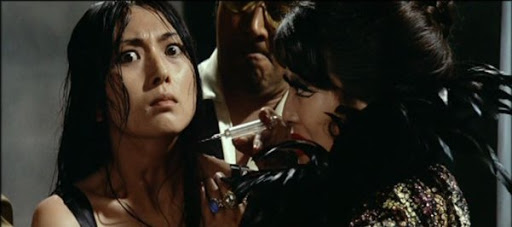
Having spent wayyyyy too much time scouring around for Meiko Kaji images, I've come to the conclusion that the girl must have some Native American in her woodpile. God...she's so damn beautiful, and her voice is as beautiful as her looks.
I'm gushing. I realize that. The way I look at it is that some things require gushing over, and she sure beats the hell out of Uma Thurman and those ugly-assed man-feet. That's all I'm sayin'. En-joy!

From Nick Pinkerton at Reverse Shot:
To most contemporary American moviegoers, actress Meiko Kaji is probably most recognizable through her singing voice: that’s her song ushering along the final head slice in Kill Bill Volume One. The tune is the theme to Kaji’s legendary-in-video-store-circles action franchise, the quintet of hell-hath-no-fury-like-a-woman-scorned Scorpion films that she made for Toei studios, all released in 1972-73, and an admitted inspiration for Tarantino’s KB volumes, alongside Kaji’s two genre high-watermark Lady Snowblood samurai pictures. As is so often the case, Tarantino’s references are impeccable, his execution bungled—the KB movies, completely insulated in their bathysphere of allusions, and starring a beautiful actress who’s never been less beautifully photographed, are accidentally closer to Truffaut’s The Bride Wore Black.
The Scorpion films revolve around prisoner #701, Nami Matsushima (Kaji; she usually goes by Sasori or Matsu—or “Scorpion,” in jailhouse lore), once a self-described “woman like any other,” (difficult to swallow for a number of reasons) now lethally hardened by the betrayal of a vice detective ex-lover: it was his set-up left her to be gang-raped by Yakuza punks, and it was a flunked attempt at retribution by Matsu that landed her in a barbarically authoritarian house of corrections.
Based on a popular manga by Toru Shinohara, the Scorpion series was transmitted to celluloid with its pulp origins (virtues and limitations) very much intact—there isn’t a single character anywhere in these films whose psychology might chafe at the limitations of a comic frame. I’ve now watched four films starring Sasori, and I could tell you remarkably little about her as a human being aside from her superhuman capacity for absorbing, thriving on, honing, and venting hatred, her penchant for visualizing orgasm as a gradually spreading red blob, and her physical description. Oh, and she seems to have a taste for couture—it’s one of the series’ most comic book-y conceits that whenever Matsu busts out, she never wastes time in reassembling her favorite costume, a belted black coat and floppy, broad-brimmed hat that make her look like she’s just stepped out of a Seventies Vogue spread.

More a monument than a person, then—the comparison has been made between Kaji’s persona and that of the Easter Island-headed Eastwood of the Man With No Name years, and it’s an apt one, thanks to one of the largest modifications in Scorpion’s big-screen reinvention, which came at the behest of the actress. Instead of the steady rumble of cusses emitted by Shinohara’s pen-and-ink heroine, Kaji petitioned to play as near as possible to mute; the iconographic image that resulted is Sasori staring, mouth pert, head lowered, eyes burning intent in the wisp of her face between the glossy curtains of her hair. This Scorpion’s a quiet, cunning assassin—not particularly strong or quick or even skilled with her weapon… but exceptionally patient, nurtured by rage, and with a lethal gift of knowing just when to slip in the shiv.
Kaji supplied those lovely, snarling eyes; the series’ director, first-timer Shunya Ito, supplied flair to fairly rote women-in-prison material: the debut film, Female Prisoner #701: Scorpion, is all glistening tits, ritualistic work-detail punishments, and sadistic hazing, but there are bravura moments of theatricality to be found, among them a rape flashback that plays like a nightclub stage show, replete with rotating walls. The following installment, Female Prisoner #701 Scorpion: Jailhouse 41, confirms the presence of some kind of formidable imagination. Ito’s plastic set-piece sensibility puffs up a fast-n’-nasty exploitation number into an imagist epic of elemental tragedy: a casual murder can stain an entire waterfall with blood; the silent death of an old woman can trigger a split-second change of seasons.

Media Blasters/ Tokyo Shock, who brought the first film of the Scorpion series its U.S. DVD debut, now fill out the domestic disc availability of the Kaji Scorpion films with two exemplary new transfers—Image’s old Jailhouse 41 release, struck from grubby-looking materials, is unfortunately out of print, and pricey used. Beast Room—which picks up with Scorpion on the loose—retains most elements of the serial’s established template: one particularly vehement enemy is assigned to Matsu, and they’ll mutually smolder in dreams of revenge through most of the film’s runtime. Along the way, she’ll cull a single trusted female friend from the mire of humanity. The enemy is a Metropolitan Tokyo detective (Mikio Narita) who gets the drop on an at-large Sasori on the subway, slaps handcuffs on her, and loses both the cuffs and his attached arm for his trouble. The friend is a self-employed hooker (Yayoi Watanabe) who submits to numbly sympathy-fucking her brain-damaged big brother in off hours away from the garish entertainment district.
While a graphic limb-lopping and an act of incest within the first reel may be enough to brand this production extravagantly grotesque to some sensibilities, I should note that it’s in fact the most contemplative entry in the series. A first in the Scorpion films are Beast Room’s downbeat passages—Matsu and her girlfriend watching trains from an overpass to the limp of Shunsuke Kikuchi’s twilit score is luxuriously melancholy. But soon enough we’re ushered into the titular chamber, a back-room kept by a sadistic Madame (Reisen Lee, who, with her taste for green eyeshade and Space Empress-style gowns, looks like an unconvincing 22nd-Century tranny with an overbite), whose menagerie includes vats of eels, caged blackbirds, and a gaggle of pimps with eyesore suits, and the genital mutilation, strong-armed late-term abortions, and vendettas kick off in turn.

The world which Matsu inhabits is ostensibly Japan circa ’72—the series first installment begins with a guard commendation ceremony, placing it “27 years after the war”—but there’s a post-apocalyptic air to the Scorpion films. The melodramatic, burbling David O. Selznick sunsets that Ito favors seem pestilent; the rocky, volcanic terrain that the prisoners pickaxe in Jailhouse 41 seems like the crust of a dead planet. We might be more accurate in assuming, however, that the Scorpion series takes place in the same universe as so many of the films collected under the broad assignation of “exploitation”: The Worst of All Possible Worlds. The representative authority figures, in prison and outside, are grafting sadists. The men we meet are buffonish salarymen, chintzy pimps—and every last one of them needs only a glimpse of opportunity to become a rapist. Is the indomitable Matsu a feminist heroine? I’m sure most “Take back the night” feminists would’ve objected to attaching that assignation to something as scurrilous as these WIP flicks, but the irony is that I can’t think of many other artworks that so closely approximate that most vehement strain of Andrea Dworkin/ Katherine MacKinnon feminism’s conception of the battle of the sexes as a real pitched warfare.
But even if the suggestion of these films, made explicit in a ceremonial song interlude in Jailhouse 41, is that “women commit crimes because of men,” the Scorpion movies, particularly the first two installments, never display a particularly charitable view of those women, either. When the guards aren’t dispensing the abuse, the shrill, scapegoating prisoners take over; any position of power or strength in numbers is promptly misused. There’s an oblique anti-authoritarianism at work in these films—Ito rarely misses an opportunity to symbolically frame a Japanese flag—but as nearly everyone onscreen seems bereft of the most basic human concern or decency (hardly anyone turns around to see a woman running past with a severed arm handcuffed to her!), it’s difficult to imagine anything clearing the overwhelming social malaise outside of the solution which Sasori undertakes: mass extermination.

Technical Information:
Title: 女囚さそり けもの部屋/Joshuu sasori: Kemono-beya/Female Prisoner #701 Scorpion: Beast Stable
Year: 1973
Country: Japan
Director: Shunya Ito
Source: Retail DVD9
DVD Format: NTSC
Container: .iso+mds
Size: 4.65 GB
Length: 1:27:01
Programs used: ImgBurn
Resolution: 720x480
Aspect Ratio: 2.35:1 letterboxed
Video: MPEG2 @ ~6800 kb/s
Frame Rate: 29.97 fps
Audio: Japanese- Dolby AC3 Stereo @ 192 kb/s
Subtitles: English
Menu: Yes
Video: Untouched
DVD Extras: Image Gallery, Trailers

(Use JDownloader to automate downloading)
女囚さそり けもの部屋 Megaupload Links


